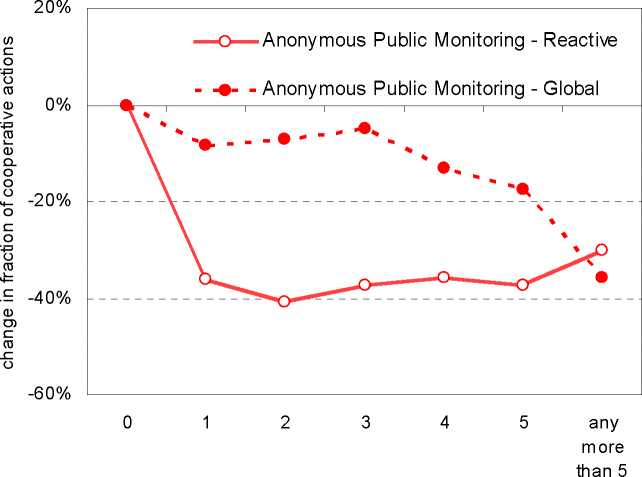predictions, since subjects could only achieve cooperation by triggering to permanent
defection. As already noted, for our parameterization the set of outcomes does not expand
with the addition of personal punishment. There are, however, behavioral reasons why
subjects may have preferred personal punishment to community punishment. In the
concluding section of the paper we will put forward some conjectures.
Result 9 (strategy employed). Subjects preferred reactive strategies over global
strategies. In the anonymous public monitoring treatment, a defection by an opponent
generated a stronger response than a defection elsewhere in the economy.
In anonymous public monitoring subjects observed whether a defection had occurred
in the match or elsewhere in the economy. Hence, both reactive and global strategies
were available. A subject using a reactive strategy punished everyone once a defection in
the match had been experienced, but kept cooperating if a defection was observed outside
the match. In contrast a subject using a global strategy started punishing everyone once
she had observed a defection, no matter if it came from an opponent or someone else.
Figure 7: Strategies of the representative subject in anonymous public monitoring

period after defection
26
More intriguing information
1. The name is absent2. Foreign direct investment in the Indian telecommunications sector
3. Wirtschaftslage und Reformprozesse in Estland, Lettland, und Litauen: Bericht 2001
4. The name is absent
5. The name is absent
6. The name is absent
7. Short Term Memory May Be the Depletion of the Readily Releasable Pool of Presynaptic Neurotransmitter Vesicles
8. Short report "About a rare cause of primary hyperparathyroidism"
9. Langfristige Wachstumsaussichten der ukrainischen Wirtschaft : Potenziale und Barrieren
10. The name is absent